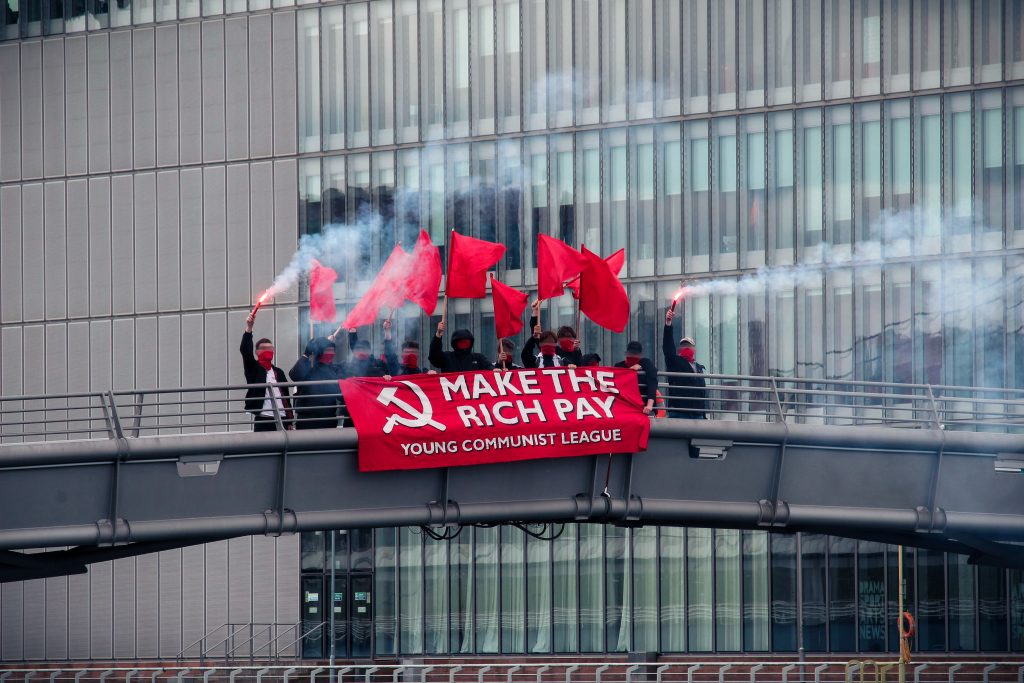Ukrainian and Russian workers lived side-by-side through the 20th century. Millions laboured and fought together as comrades and sacrificed themselves to defend Soviet socialism from the Nazis. 30 years after the tragic dissolution of the Soviet Union, which was hailed by many in the West as the “end of history” and the start of a uniformly liberal, peaceful world, the restored capitalist class of the Russian Federation now dredge medieval historiography to exonerate pointless war in the present.
Analysis on whether we should take Putin’s casus belli of “denazification” at face value, whether we stand in solidarity with a Ukrainian government that has been liquidating the Ukrainian left from 2014 to the present day, or whether ‘our own’ Western militarists and media pundits have our class’ interests at heart, when they flirt with escalating the situation into a full-scale international war between NATO and Russia, is beyond the scope of this article. Leave it to the armchair pundits to pore over the deluge of misinformation and judge which group of workers most deserve death.
Instead, we should discuss how the slogan ‘no war but the class war’ is not a shibboleth of an ineffectual left, but watchwords for the workers’ movement. We must recognise that right now in Britain and most of Europe, the labour movement and the socialist left can only affect significant material change in our own countries. The best thing we can do to ensure a peaceful de-escalation of the conflict in Ukraine is to obstruct the imperialist ambitions of our own bourgeoisie — and Boris Johnson is one of the most impetuously bellicose Western leaders right now –– by intensifying the class-struggle at home.
Sabre-rattling has been a lifeline for Johnson, amidst the ‘partygate’ scandal emanating from leaks within the Conservative party. Talking tough against Russia and going for a photo-op on the streets of Kiev with Zelensky has been a welcome distraction. But this reconsolidation of ruling-class opinion behind a ‘statesmanlike’ Johnson cannot mask the mounting privations inflicted on the working class.
Millions, already struggling before the hardships of the COVID-19 pandemic, now find themselves unable to afford the bare necessities to live. This cost-of-living crisis is not the result of some cacophonous, metaphysical economic factors but rather the flagrant profiteering of the energy and retail giants. I could quote the government’s measure of living costs, the consumer price index, being on course to rise to 9% by the end of April, but do you really need some aloof analyst’s clinical measurement of how skint you are to know you are struggling? The weather is getting warmer and yet your energy bill is still a rip-off. A weekly shop for groceries is costing us ten, fifteen, twenty pounds more than we previously used to pay. That famous precursor to the French and Russian revolutions –– the cost of bread shooting up –– has arrived. So, where are our red flags and riots in the streets?
The left cannot simply give tepid complaint in response to immiseration. If the ruling class can make us submit to declining living standards, they will be empowered to eventually send our youth to die in Ukraine –– or the next Ukraine. Poverty is the greatest recruiting sergeant.
A competent, class-focused political campaign that rejects corpulent price-hiking would undermine the ruling class spectacularly. Demands for bringing energy infrastructure into public ownership and price caps on groceries should be fought for with open resistance –– getting millions of people to refuse to pay energy bills, overriding electricity meters (it’s apparently easier than you might think) for whole blocks, streets and neighbourhoods; protest and direct action against supermarkets, with organised incidents of ‘proletarian shopping’ donated to food banks or simply kept; well-targeted campaigns against the fat cats personally, not by holding placards in city centres but furious demos in their front gardens, along their gilded driveways- banners crowning their homes.
Politically, an outright refusal to accept our impoverishment, with a clear demand that all that is necessary for a decent life be treated as we once treated healthcare via the NHS –– state-owned, collectively funded, and free at the point of use.
These are strategies that win concessions and embolden our class. A government trying to deal with that level of working-class militancy will not have the stability to risk involvement in a conflict hundreds of miles from home.
Obviously, we want a prompt ceasefire in Ukraine and an immediate end to the senseless bloodshed. Obviously, we wish for a diplomatic resolution to this invasion that results in Ukrainian neutrality and no more future war. But mere ‘hope’ will not make the clashing capitalist geopolitical ambitions manifest a utopian ‘world peace’.
The working class must answer the jingoist cries for war and ‘patriotic’ class-collaboration with its own slogan –– no war but the class war. Capitalism is the mortal enemy of fraternity between nations. To demand an end to all war is to demand the overthrow of capitalism and a new society controlled by and for workers. That is something worth fighting for.
James Meechan, is a member of the YCL’s Glasgow branch



